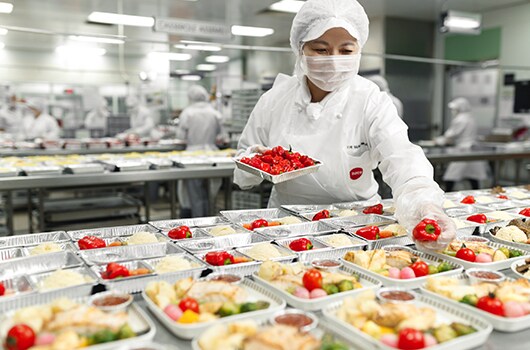Beefing Up Asia's Food Resilience
Beefing Up Asia's Food Resilience
In Brief
- Demand for protein in Asia is rising. Faced with climate change and declining production yields, companies in the region are developing novel solutions without the use of animals.
- Food producers are developing plant-based proteins tailored for the Asian palate.
- A joint project between Temasek, SATS and the Singapore Economic Development Board helped kickstart one of the first plant-based protein distribution channels in Southeast Asia.

This laksa’s shrimp is made from vegetables!
(Photo: Growthwell Group)
In the past, most of the plant-based food options available in Singapore were simply deep-fried wheat or gluten-based products, shares Justin Chou, 31. Such a limited variety of food options compelled his father, Chou Shih Hsin, a Buddhist vegetarian, to start plant-based protein manufacturing company Growthwell Group in 1989.
"Back then, plant-based protein alternatives weren't so 'sexy'. They were just called ‘mock meat’ instead of being the ‘future of meat’," he quips.
Today, Chou is the executive director of Growthwell, and he is spearheading the family business’ transformation from a manufacturer to a leading innovator in nutritious, plant-based proteins. One of Growthwell’s key business strategies, Chou says, is to capture new consumer markets in Asia by developing new plant-based products.
“I want to feed 100 million people with plant-based foods, and to inspire a billion people to go green,” he declares.

Growthwell Group’s second-generation leader, Justin Chou (right), with his father and Growthwell founder Chou Shih Hsin.
(Photo: Growthwell Group)
“Meat-ing” Food Security Needs
Growthwell’s plan to increase its plant-based protein offerings comes at an opportune moment, as the world’s ability to feed 10 billion mouths by 2050 has become a growing concern in recent years.
Asia, in particular, is at an inflection point: rapid industrialisation has led the region to enjoy the world’s highest GDP-per-capita growth rate for over half a century. This, in turn, has resulted in more affluent Asians shifting away from carbohydrates towards resource-intensive animal proteins like beef.
Yet, this transformation comes at a time when the effects of climate change are placing significant stress on Asia’s food systems. Already, the continent’s arable land per capita is one of the lowest in the world at around 1,100 square metres — just slightly larger than the size of two basketball courts. This is expected to fall by 5 percent by 2030, leaving Asia with only one-fifth of the world’s agricultural land, according to the inaugural Asia Food Challenge report, published by PwC, Temasek and Rabobank.
“Asia will be home to more than half of the world’s middle-class population by the end of this decade, and there is a strong positive relationship between income levels and demand for animal protein,” observes Rohit Bhattacharya, Director of Enterprise Development at Temasek. “But the way animal protein is produced today is very resource intensive.”
The world needs to innovate and become more efficient at food production if we want this planet to continue sustaining our children and their children.
Rohit Bhattacharya
Director, Enterprise Development
Temasek
Seafood That’s Not from the Sea
The challenges in bridging the protein gap provide an opportunity for plant-based protein and cultured meat producers, which typically require less resources to produce than protein from animal sources.

A diet consisting of less meat and more vegetables tends to be better for the planet, as plants sport smaller environmental footprints.
Already, consumers in the region are biting. In China alone, the plant-based meat market is predicted to reach a whopping US$11.9 billion by 2023.
Growthwell’s Chou believes this trend is driven by millennials who are incorporating more plant-based proteins in their diets for health and environmental reasons. Eager for a slice of the rising plant-based protein pie, Chou, himself a millennial, is pivoting Growthwell to develop new plant-based protein products tailored for Asian cuisines, such as “shrimp” and “crab patties” made with novel chickpea proteins.
“If you can offer an affordable and convenient solution — and position the benefits well — consumers wouldn’t mind adopting a more plant-based or flexitarian lifestyle,” says Chou, referring to vegan diets and the flexible approach to a vegetarian diet that occasionally includes animal meat.
One of the first steps? Do not position plant-based products as “mock meat”, he says. “You don’t look at soya bean milk and say it’s mock dairy!”

Growthwell aims to launch its chickpea “seafood” range across Southeast Asia in the near future. (Photo: Growthwell Group)
End-to-end Innovation with Plant-powered Protein
Country Foods, a wholly-owned subsidiary of SATS Food Services, is also making a splash in Asia’s plant-based protein space. One of the first to distribute plant-based proteins in Southeast Asia, Country Foods works with plant-based protein producers like Growthwell, Impossible Foods and Fable to connect them with the region’s largest food and beverage (F&B) players.
Despite being one of Singapore’s largest meat protein importers, distributors, and processors, Country Food’s push into plant-based proteins only began last August, shares Alfred Aloysius, Head of Global Sourcing and Procurement at SATS. The idea, he says, was born out of an exploratory project between SATS, Temasek and the Singapore Economic Development Board (EDB) to gauge the region’s appetite for plant-based proteins.
Temasek’s Bhattacharya, who was part of the project team, learned from global plant-based protein players that getting a foothold in Asia was an uphill challenge "because it is uniquely diverse”.
“You need to know the taste preference of consumers in each market, which requires deep expertise on the ground,” he adds.
The food producers Bhattacharya’s team spoke with were receptive to the idea of being introduced to Country Food’s existing network of Southeast Asian F&B players. The three-month-long project eventually culminated in Asia’s largest showcase of plant-based protein products at the Grand Hyatt Singapore last November, as part of the 2019 Agri-Food Innovation Week.

Over 180 industry representatives attended the showcase, organised by SATS, Temasek and EDB, to sample regional delicacies made with plant-based proteins.

Plant-based sushi with a raw tuna alternative made from tomatoes.

Satay made from plant-based meat protein.
More than just being a distributor of plant-based proteins, Country Foods has its eyes set on expanding further up the value chain. Its first step: partnering global foodtech producers to co-manufacture their products in Singapore. According to Aloysius, some co-manufactured products include two MOS Impossible Burgers and BreadTalk’s The Impossible Pepper Bun.
“As we delved deeper into this space, we realised that we could do a lot more to buffer against supply chain disruptions, especially during crises, by expanding up and down the entire product chain — from sourcing and manufacturing to preparing and packaging ready-made meals,” says Aloysius.
Building Food Resilience in Asia
Plant-based proteins and supply chain innovation are two promising approaches that have the potential to address global agri-food problems, shares Temasek’s Bhattacharya. “Beyond just being a provider of capital, Temasek has actively connected portfolio companies with fellow industry partners across the agri-food value chain in different markets to unlock new opportunities.”
This has led to innovative solutions that address inefficiencies across the value chain, as well as a wider variety of products for end-consumers, says Bhattacharya. “We aim to create a more resilient and sustainable agri-food ecosystem for consumers and producers alike.”
Temasek is an investor in Growthwell Group, SATS and Impossible Foods.

